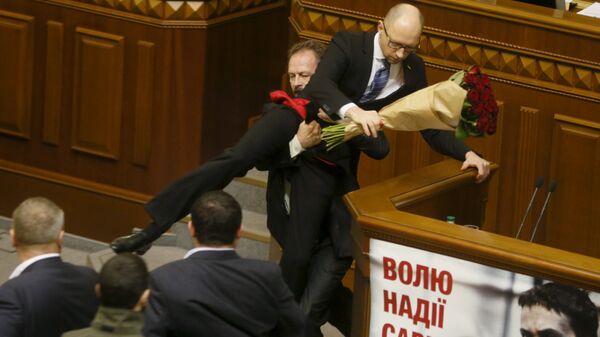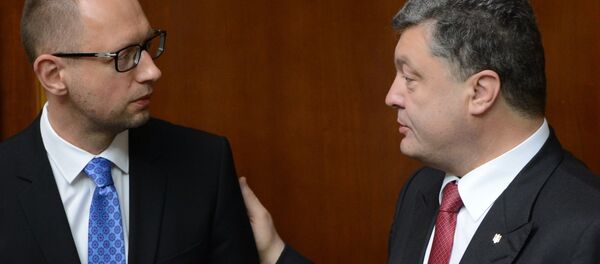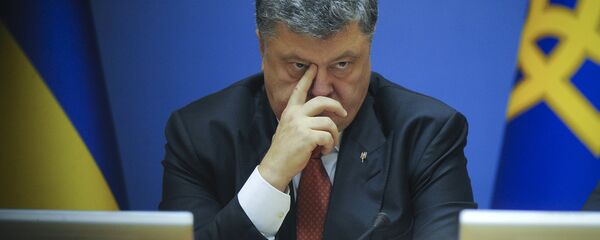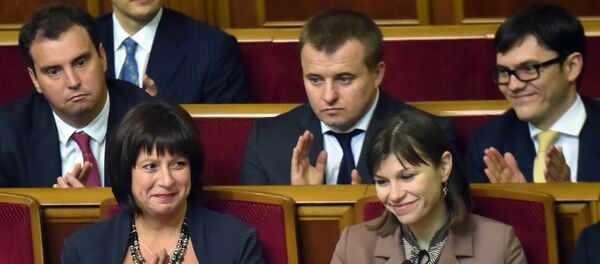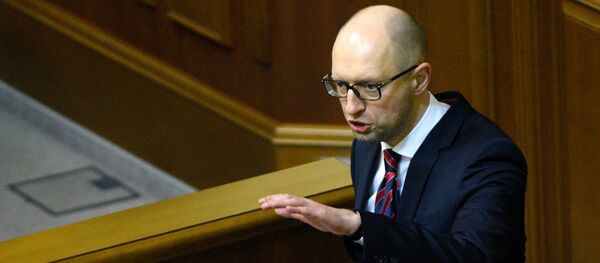On Monday, the Poroshenko Bloc parliamentary fraction said following a review that it considered the cabinet's work in 2015 as 'unsatisfactory', and that it would support a vote to dissolve the government.
Following the failure of the vote, absent an early disintegration of the country's governing coalition, parliamentary rules state that the MPs will be allowed to table the government's resignation only at the next session of parliament, slated to open September 6.
To Ukraine watchers, another political scandal in the country is hardly a surprise, with post-Maidan Kiev rocked by a new scandal every other week. What is remarkable, however, is the way in which much of the Western English-language print media has covered the Poroshenko-Yatsenyuk tussle, repeatedly and openly using words like 'investment' and 'stakeholders' to describe the patron-client relationship with Kiev.
For openers, Reuters, in a paragraph wedged between a description of the no-confidence vote and the corruption plaguing the country, curiously recalled for some reason that "Ukraine's international backers have invested much money and political capital backing the government in its stand-off with Moscow…following the overthrow of Kiev's pro-Russian president by protesters."
Foreign Policy magazine was more self-critical, dragging both Yatsenyuk and Poroshenko through the mud and suggesting, somewhat disingenuously, that "the West shares the blame for the reformers' failure to win the fight for change in Ukraine."
"As direct stakeholders in its future, with billions of dollars already invested through bailout loans and aid, the country's foreign partners and supporters have been remarkably idle in pushing for specific reforms," the magazine noted.
Moreover, the magazine added, "not a single question was asked when President Poroshenko staffed his administration with former business partners and friends with dubious backgrounds while refusing to sell his own vast corporate assets, as he had promised."
Ultimately, Foreign Policy warned, "Ukraine's Western partners may find themselves facing much higher costs to fix the mess," lest the West wants to see "a full-blown Ukrainian collapse."
But perhaps vehement Russia critic Adrian Karatnycky, a senior fellow at the Atlantic Council, was the most honest about Washington and Brussels' true goals in Ukraine. Western officials, he explained in his op-ed for Politico, were against the dismissal.
Bluntly admitting just how dependent the contemporary 'Ukrainian project' is on Western financial and political support, Karatnycky, the former president of the US government-affiliated NGO Freedom House, emphasized that the West is not just a bystander: it is a 'stakeholder'.
"Western leaders, who have put together a $27.5 billion bailout [loan] package for Ukraine, are more than mere bystanders; they are stakeholders in Ukraine's success. If there are to be changes at the top of Ukraine's government, they told Poroshenko, he must guarantee that such changes will ensure stability."
Who but the most skeptical of Washington and Brussels' critics could have guessed, two years after the Maidan 'revolution of dignity', that the Ukrainian leadership's political decisions would turn out so openly to be the prerogative of Western 'stakeholders'. Or that Western media would talk about it so openly?
"Western leaders did not issue their demand because they support or trust Yatsenyuk," Karatnycky explained. "They did so because they knew that a period of political uncertainty can erode support for the maintenance of sanctions against Russia."
In other words, the message seems to be, let Ukraine struggle and slowly disintegrate politically, socially and economically – what's most important to Kiev's Western 'stakeholders' is that they get to extend their anti-Russian sanctions, and ultimately, keep Kiev and Moscow from normalizing their political and economic relationship, no matter the ultimate cost.
